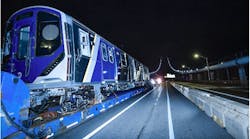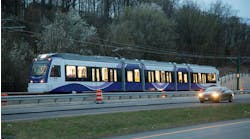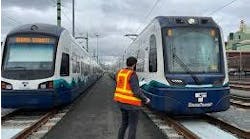MTA to consider option for 435 additional R211 subway cars from Kawasaki Rail Car Inc.
An additional order for 435 R211 subway cars has been approved by the Metropolitan Transportation Authority (MTA) New York City (NYC) Transit Committee, authorizing the full MTA Board to consider the order. This order includes 355 closed-end cars (R211A) and 80 open-gangway (R211T).
The option would bring the total number of R211 cars ordered to 1,610. There are currently 345 R211 cars in service throughout the NYC Transit system, including on the A and C lines and the Staten Island Railway.
“This latest order is putting the MTA closer towards its goal of fully modernizing the system,” said MTA Chief of Rolling Stock Tim Mulligan. “The R211s are state –of-the-art and less prone to breakdowns, which means smoother trips for tens of thousands of New Yorkers and more reliable service for decades to come.”
The R211s will eventually replace all R44s on the Staten Island Railway and the current fleet of R46 subway cars, which have been in service on the A and C lines, as well as the N, Q, R and W lines for decades. This new option will also allow NYC Transit to begin replacement of the R68s, which entered service in the mid-1980s and primarily operate on the B, D, N and W.
MTA notes the new railcars have an average mean distance between failure (MDBF) rate of approximately 220,000 miles, compared to the R46’s 46,000 miles. According to the authority, the MDBF is a measure of how far the railcar can travel before a mechanical issue occurs and requires maintenance. Delivery is expected to begin in 2027.
The approval of the new railcars builds on the MTA’s ongoing efforts to modernize its entire fleet of rolling stock. The R211 features security cameras in every car, more accessible seating, brighter lights, clearer signage and 58-inch-wide door openings, which are eight inches wider than standard door openings on existing cars.
“Old train cars break down six times as frequently as new cars, so replacing them is more than just a matter of aesthetics,” said MTA Chair and CEO Janno Lieber. “This latest purchase will help us get the next generation of rolling stock on the rails sooner so we can keep making the system more reliable and dramatically upgrade the passenger experience.”
In January 2018, the MTA Board awarded the contract to Kawasaki Rail Car Inc. to design, build and deliver 535 subway cars, comprised of 440 closed-end cars (R211A), 20 open-gangway (R211T) and 75 cars for Staten Island Railway.
The contract included two options:
- Option 1 for 640 cars
- Option 2, which proposed either ordering 333 or 437 cars.
In October 2022, the board authorized option 1 to exercise an additional 640 closed-end cars (R211A) in the estimated amount of $1.78 billion. This new decision to exercise option 2 for 435 cars comes at an estimated price of $1.27 billion.
Beginning early next year, NYC Transit will run at least two open-gangway trains on the G line, making it the second subway line to have open-gangway trains. G train customers will have a 1/5 chance of riding an open-gangway car. Open-gangway trains first operated on the C line earlier this year.
“These new train cars make the world of difference for transit riders, in both reliability and the customer experience with better amenities for passengers,” said NYC Transit President Demetrius Crichlow. “These cars come CBTC equipped to provide faster, more frequent and reliable service and strengthens security with subway car cameras. Additionally, G train riders can soon look forward to two open-gangway trains running on their line, the second line to operate with R211Ts.”



